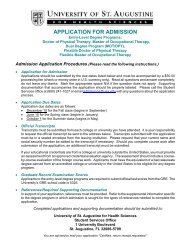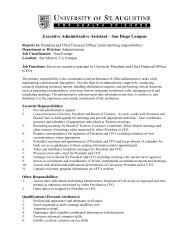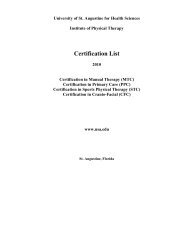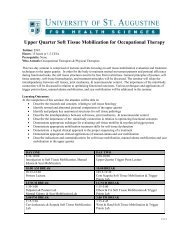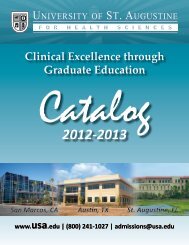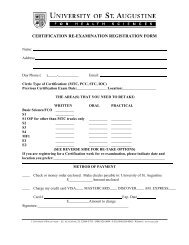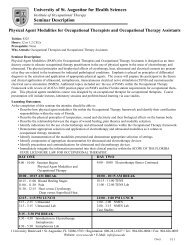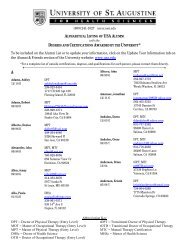In addition, the course will address the issue <strong>of</strong> how the failure <strong>of</strong> one organ system may affect thefunction <strong>of</strong> others.HSC 5610 – Administration and Management in OT and PT Hours: 2The emphasis <strong>of</strong> this course is the application <strong>of</strong> administrative principles to the pr<strong>of</strong>essions <strong>of</strong>occupational therapy (OT) and physical therapy (PT). The primary topics <strong>of</strong> the course are:organizational and legal structures, supervision and management, quality assurance, fiscal management,human resources, and marketing. Guidelines <strong>for</strong> specific practice settings (e.g., skilled nursing facilities,home health, and outpatient) are also explored. Case scenarios are emphasized and higher level learningis required.HSC 5700 – Wellness and Prevention Hours: 3This course will present the concept <strong>of</strong> Wellness as a foundation to rehabilitation services andinterventions. It will allow the students to investigate their own personal wellness and to internalize thein<strong>for</strong>mation, to become role models <strong>of</strong> Wellness in the health care pr<strong>of</strong>ession. Additionally, the concepts<strong>of</strong> Wellness will be applied to the practice <strong>of</strong> rehabilitation, making relevant the content to the student’sroles as future pr<strong>of</strong>essionals. The course will include a health risk appraisal, fitness testing, nutritionanalysis, emotional/mental assessments, self-reflections, identification <strong>of</strong> barriers to change, goal settingand problem-solving <strong>for</strong> applications to real-life clinic/home situations the rehabilitation specialist mayencounter. Further, this course will incorporate area pr<strong>of</strong>essionals <strong>for</strong> the presentation and integration <strong>of</strong>Complementary/Alternative <strong>for</strong>ms <strong>of</strong> medicine.HSC 5741C - Applied Medical Physiology Hours: 4This course is designed to provide an organ system based overview <strong>of</strong> human physiology. The coursewill emphasize the mechanism <strong>of</strong> function <strong>of</strong> the organ systems and their feedback controls that help toachieve and maintain internal bodily homeostasis. While basic concepts will be emphasized,opportunities will be provided to extrapolate from this foundation to areas <strong>of</strong> interest and application tothe occupational and physical therapy students. The laboratory component is designed to rein<strong>for</strong>cephysiology lecture topics through practical application.HSC 5800 – Gerontology Hours: 3This course allows the student to synthesize the knowledge, skills, and values that are essential to thecare <strong>of</strong> the elderly person. The interactions <strong>of</strong> physical, physiological, cognitive, and psychosocialvariables are examined. Use <strong>of</strong> occupational and/or physical therapy to promote, maintain, and restorehealth in this population is emphasized. This course is 3 contact hours per week plus community service.HSC 6100E – Electrotherapy: Principles and Clinical Applications Hours: 2For OrthopaedicsThis course will provide the clinician with a conceptual understanding <strong>of</strong> the physiological basis andrationale <strong>for</strong> modern techniques in utilization <strong>of</strong> electrotherapy <strong>for</strong> improved function and painmodulation. Selection <strong>of</strong> appropriate electrotherapy equipment, wave <strong>for</strong>m characteristics, and the latesttreatment techniques used <strong>for</strong> muscle and nerve stimulation are presented. This course is delivered onlineand utilizes the interactive video demonstrations, interactive discussions and recent literature to supportuse <strong>of</strong> electrotherapeutic modalities in your practice.HSC 6100 - Electrotherapy Hours: 2This online course provides the clinician with a conceptual understanding <strong>of</strong> the physiological basis andrationale <strong>for</strong> modern techniques in utilizing electrotherapy <strong>for</strong> improved function and pain modulation.Selection <strong>of</strong> appropriate electrotherapy equipment, wave <strong>for</strong>m characteristics, and the latest treatmenttechniques used <strong>for</strong> muscle and nerve stimulation are presented. This course is delivered online and94
utilizes the interactive video demonstrations, interactive discussions and recent literature to support use<strong>of</strong> electrotherapeutic modalities in your practice.HSC 6210 - Extremity Evaluation and Manipulation (E1) Hours: 2Based on the E1 Extremity Evaluation and Manipulation Seminar, this online course <strong>for</strong> the DPTProgram extends the content <strong>of</strong> the seminar to the application and analysis level <strong>of</strong> learning <strong>of</strong> peripheraljoint examination and treatment. Clinical decision making strategies or peripheral joint examination andtreatment are strengthened through the use <strong>of</strong> selected readings required <strong>for</strong> this course. A prerequisite iscompletion <strong>of</strong> the CPE Seminar “Extremity Evaluation and Manipulation (E1)” <strong>of</strong>fered by the<strong>University</strong>.HSC 6300E – Advancing Hand Therapy Hours: 2This course focuses on conditions that you would most typically treat in an outpatient orthopaedic handclinic setting. I will be presenting these conditions with a variety <strong>of</strong> media that will complement thecontextual and facilitate your learning. The purpose <strong>of</strong> this course is to present the in<strong>for</strong>mation in a waythat will augment your application <strong>of</strong> clinical reasoning skills when treating the upper extremityorthopaedic patient. My goals with this course are first, to add to your existing knowledge base in thearea <strong>of</strong> upper extremity orthopaedic rehabilitation following trauma, disease process and postsurgicalintervention. Secondly, to enable you to apply this additional evidence based material to challenge youinto creating new clinical reasoning skills that will optimize your effectiveness with patient treatment. Ifyou have no experience with treating upper extremity orthopaedic patients, or you do not currently workwith this type <strong>of</strong> patient, or you have limited experience; then this course will be challenging <strong>for</strong> you.You will be doing more reading and research than you thought you would. This is a time intensive courseand you should be prepared to devote a minimum <strong>of</strong> 2 hours a day to asynchronous online discussionsand preparation <strong>of</strong> assignments. It is my intention, by end <strong>of</strong> the course; you will feel that you haveacquired skills that will make you a better clinician in more than one area. You will get as much out <strong>of</strong>this course as you put into it. Are you up <strong>for</strong> the challenge?HSC 6300 – Advancing Hand Therapy Hours: 2This course focuses on diagnoses found most typically in a hand clinic setting. Through the use <strong>of</strong>pictures, video and presentations, students will be exposed to the most current treatment evidence <strong>for</strong>advanced practitioners. The purpose <strong>of</strong> this course is the application <strong>of</strong> clinical reasoning skills in thehand therapy setting and upper extremity orthopaedic rehabilitation following trauma, disease processand post-surgical intervention. <strong>St</strong>udents should be prepared to devote a minimum <strong>of</strong> 2 hours a day toonline discussions and preparation <strong>of</strong> assignments while collaborating, learning and exploring the virtualhand clinic.HSC 6320E – School-Based Practice Hours: 2This course examines legal and pr<strong>of</strong>essional aspects <strong>of</strong> school-based practice <strong>for</strong> the physical andoccupational therapist. Participants will review the history <strong>of</strong> school-based practice including theevolution <strong>of</strong> related legal requirements and implications to practice. Respective occupational andphysical therapy pr<strong>of</strong>essional guidelines <strong>for</strong> the school-based therapist including data collection,documentation and evidence-based practice will be explored. Use <strong>of</strong> assessment tools, examination <strong>of</strong> theindividual. Educational Program (IEP) process, discussion <strong>of</strong> service intervention models andexploration <strong>of</strong> the differences between the school verses medical model <strong>of</strong> practice are discussed, with anemphasis <strong>of</strong> the importance in collaboration throughout the process. Bulletin Board (BB) interaction isused to post assignments, address unit topics, facilitate interactions between students and instructor,promote learning between participants and respond to other student’s comments. Assignments followeach course unit that requires participants to generalize and utilize in<strong>for</strong>mation presented and use95
- Page 4 and 5:
San Diego sunsetSt. Augustine and o
- Page 6 and 7:
STUDENT SERVICES ..................
- Page 8 and 9:
DOCTOR OF EDUCATION (EdD) .........
- Page 10 and 11:
San Marcos, California CampusSt. Au
- Page 12 and 13:
certification. A felony conviction
- Page 14 and 15:
In 1996, the Institute of Occupatio
- Page 16 and 17:
Learning Resource CenterThe Univers
- Page 18 and 19:
ENTRY-LEVEL PHYSICAL THERAPY, OCCUP
- Page 20 and 21:
SUMMER 2012 TRIMESTERApril 30Intern
- Page 22 and 23:
TRANSITONAL DOCTOR OF PHYSICAL THER
- Page 24 and 25:
BOARD OF TRUSTEESMr. Joseph Taylor,
- Page 26 and 27:
• Graduate Record Examination sco
- Page 28 and 29:
• The right to inspect and review
- Page 30 and 31:
San Marcos Campus: The full-time DP
- Page 32 and 33:
Transitional Doctor of Physical The
- Page 34 and 35:
Scholarships are awarded to the ent
- Page 36 and 37:
San Marcos Campus - The entry-level
- Page 38 and 39:
Director, will determine if the sub
- Page 40 and 41:
The student obtains and submits the
- Page 42 and 43:
Good Academic Standing StatusPrior
- Page 44 and 45:
Appeal letters should address:• T
- Page 46 and 47:
TUITION AND FEESThe University of S
- Page 48 and 49:
Currently enrolled students who are
- Page 50 and 51:
TRIMESTER IITrimester HoursHSC 5122
- Page 52 and 53:
TRIMESTER IITrimester HoursHSC 5122
- Page 54 and 55: Dual Degree Option (MOT and DPT)The
- Page 56 and 57: TRIMESTER IXTrimester HoursPHT 5824
- Page 58 and 59: Mission StatementThe mission of the
- Page 60 and 61: TRIMESTER XTrimester HoursPHT 5140C
- Page 62 and 63: TRIMESTER IITrimester HoursHSC 5122
- Page 64 and 65: TRANSITIONAL DOCTOR OF OCCUPATIONAL
- Page 66 and 67: Delivery of transitional OTD Course
- Page 68 and 69: BSC 6101 Application of Motor Contr
- Page 70 and 71: TRANSITIONAL DOCTOR OF OCCUPATIONAL
- Page 72 and 73: Delivery of OTD CourseworkCourses i
- Page 74 and 75: Advanced Practice CoursesBSC 6001 F
- Page 76 and 77: TRANSITIONAL DOCTOR OF PHYSICAL THE
- Page 78 and 79: • For the speciality clinical tra
- Page 80 and 81: Craniofacial TrackCourse # Course T
- Page 82 and 83: TRANSITIONAL DOCTOR OF PHYSICAL THE
- Page 84 and 85: • If a Clinical Residency is chos
- Page 86 and 87: Craniofacial TrackCourse # Course T
- Page 88 and 89: DIVISION OF POST-PROFESSIONAL STUDI
- Page 90 and 91: Complete a minimum of one (1) cours
- Page 92 and 93: TUITION AND FEES - Doctor of Health
- Page 94 and 95: A credentialing evaluation from an
- Page 96 and 97: COURSE DESCRIPTIONSPrefix key:BSC -
- Page 98 and 99: scientific literature needed to gui
- Page 100 and 101: EDF 7125 - Organizational Leadershi
- Page 102 and 103: HSA 6101E - Health Services Adminis
- Page 106 and 107: individual reasoning and acquired k
- Page 108 and 109: HSC 7300 - Imaging for Physical and
- Page 110 and 111: OCT 5005 - Clinical Reasoning Hour:
- Page 112 and 113: OCT 5802 - Fieldwork IA Hour: 1This
- Page 114 and 115: OCT 6497 - Capstone Project 2 Hours
- Page 116 and 117: Assignments and course work will em
- Page 118 and 119: elective area of orthopaedic examin
- Page 120 and 121: learning, and skill acquisition. Ne
- Page 122 and 123: PHT 5805 - Practicum II Hours: 2Thi
- Page 124 and 125: anatomical principles for the enhan
- Page 126 and 127: sixth day. Prerequisites are BSC 60
- Page 128 and 129: practice where they will have the o
- Page 130 and 131: DIVISION OF PROFESSIONAL EDUCATIONC
- Page 132 and 133: Sports Physical Therapy Certificati
- Page 134 and 135: Advance Payment ProgramThe Advance
- Page 136 and 137: CLINICAL ORTHOPAEDIC RESIDENCYThe u
- Page 138 and 139: ORTHOPAEDIC MANUAL PHYSICAL THERAPY
- Page 140 and 141: FACULTY FOR CONTINUING PROFESSIONAL
- Page 142 and 143: Robert Stanborough, PT, Assistant P
- Page 144 and 145: Matthew Daugherty, PT, OTR/L, Instr
- Page 146 and 147: Marcia Kessack, RN, Adjunct Faculty
- Page 148 and 149: Marilyn Miller, PT, Associate Profe
- Page 150 and 151: Robert Stanborough, PT, Assistant P
- Page 152: Clinical ExcellenceThrough Graduate



